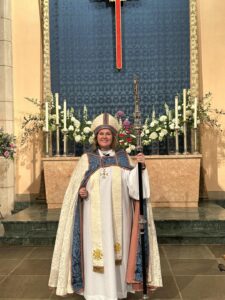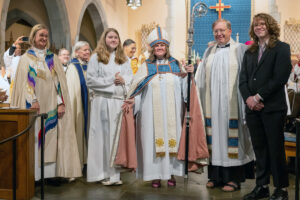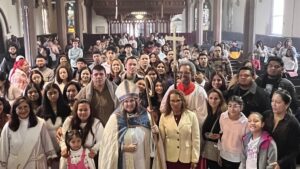 On June 24, Dr. Sally French ’95, M. Div ’01 was consecrated and installed to serve as the 13th Bishop of the Episcopal Diocese of New Jersey. Sally took a few minutes to answer some of our questions about the challenges and opportunities in New Jersey, about being Bishop, about the differences between the Anglican-Canadian and Episcopal-American church and finding faith at Trinity.
On June 24, Dr. Sally French ’95, M. Div ’01 was consecrated and installed to serve as the 13th Bishop of the Episcopal Diocese of New Jersey. Sally took a few minutes to answer some of our questions about the challenges and opportunities in New Jersey, about being Bishop, about the differences between the Anglican-Canadian and Episcopal-American church and finding faith at Trinity.
1. Congratulations on your election and consecration as the 13th Bishop of New Jersey! What have you learned about episcopal ministry so far?
I’ve learned so much that it’s hard to know where to begin. My previous position elsewhere was as diocesan staff, and in my 23+ years of ordained ministry I’ve had a variety of leadership roles, but this is on a different level! I’m still figuring out pacing and responsiveness. There’s a sweet spot between unprepared and overdue, and I’m working to listen to the Holy Spirit and to develop the skills to know when it’s time to act. Adjusting to the volume of emails, phone calls, and meetings, while simultaneously working on system change and vision, is the biggest part of the learning curve for new bishops and although it never really diminishes, I think it will get easier to manage.
On the more challenging side, some of what I’m asked to do is difficult. I’m with congregations and leaders, both lay and ordained, in very challenging situations. I have a particular role in the disciplinary process in cases of clergy misconduct. And when there is bad news to share, it falls to me. I’m also uniquely equipped by both polity and ordination to address these challenges, even if I am still figuring out best practices. While it can be hard, it’s also deeply meaningful.
One thing that I am really only beginning to understand is what it means to be the bishop. When I walk into the room, I’m there with every bishop that any participant has ever met, whether positive or negative. I carry the expectations, am responsible for the shortcomings and failures, and get credit for the good and faithful work that others have done. Whatever I say or do has weight, and sometimes things have unintended consequences. I’m learning to be attentive to this bigger impact, and to use the opportunities for God’s good purpose. Finally, as the bishop, I get to celebrate what’s good and to lift up the places were God is at work in a community or a ministry. I can be a support and an advocate for God’s people, for which I am both grateful and humbled.
2. You and your family had to move to the Diocese of New Jersey. What is interesting about your new diocese?
There’s a lot that is interesting about the Diocese of New Jersey. We cover most of the state, beginning at Newark airport and including the Jersey Shore, Atlantic City and Cape May (the birding capital of America, which is great for my birder husband). South Jersey is a mix of rural towns and Philadelphia suburbs. Central Jersey is home to Princeton University and Princeton Theological Seminary (a tremendous resource for our students and clergy), and our northernmost churches are located in commuter suburbs for New York City. The state is one of the most diverse states in the USA, and there is tremendous growth in our multicultural communities. Our churches are enriched by this diversity and we offer services each week in English, Spanish, Haitian Creole, French, and Igbo (Nigerian). New Jersey is a large diocese in terms of people and congregations, with 136 congregations and only one bishop, so there’s a lot to do!
This diocese is the second oldest in The Episcopal Church founded in 1785, although our oldest congregation dates from a century before that. Our challenges include issues with church property and deferred maintenance, alongside limited resources and declining membership, which is pretty consistent across the Episcopal Church today. We’re planting fewer churches today than we once did, but there are still areas and congregations experiencing tremendous growth, often (but not exclusively) in our multicultural communities. Last Sunday, I confirmed 48 people in one of our Hispanic congregations. For New Jersey, there are interesting opportunities for growth in mission, and we’re focusing now on increasing congregational vitality and ensuring that we have the staff, leaders, and resources to respond to God’s call.
3. You were raised and educated in Toronto, then ordained and served in the Diocese of Edmonton before moving to the US. What are the most significant differences between the Anglican Church of Canada, and The Episcopal Church?
Size and history are two of the biggest differences. In general, The Episcopal Church is about 3-4 times larger than The Anglican Church of Canada, and although both churches are dealing with diminishing numbers and resources, the difference in scale is significant. For context, in 2022 TEC had 111 dioceses and almost 6800 congregations. There are some differences in polity due to both size and history, and we use different names for some very similar things. The American Church didn’t want to be known as the Church of England or Anglican, as they were established just after the American Revolution, so we became the Episcopal Church, or ‘the church that has bishops.’ We have diocesan and general conventions, instead of synods, and there are other differences of terminology, but in general both churches are clearly Anglican in worship and polity.
American history is complex. I’ve lived in the USA for almost 19 years, and I am only now beginning to grasp the extent to which the history of slavery has shaped this nation and this church. Much of our governing structure, in both church and society, was founded in systems that perpetuated privilege and bias, and we still have a lot of work to do to fully acknowledge our past and come to terms with our present. The Canadian Church also has work to do in this area, but the legacy of slavery has a profound impact on the Episcopal Church. The church is changing today and leadership at all levels is becoming much more diverse, but this is a very recent development and we are still working out what it means to invite people into leadership who may not look or act like their predecessors, and to support diverse congregations and communities.
Overall, what we have in common is much more significant than our differences. We share patterns and practices of worship, a love of our tradition and of the Book of Common Prayer in its various forms, and a deep commitment to inclusive and compassionate Christianity.
4. In your biographical materials, you share that you came to faith at university through campus chaplaincy—and of course we know that means Trinity College Chapel. Can you say more about that?
I’ve said a few times that my adolescent rebellion was finding Jesus, and that really was true for me. I grew up in a secular home, although the church we weren’t attending was the Anglican Church of Canada. When I was an undergraduate, I found that I was a bit adrift; I wasn’t sure where I fit, I didn’t know what I wanted to study, and I had no idea what I would do when I was finished. One Sunday morning in October 1990, I ended up at the 10am chapel service. I was slightly late because I was nervous. I remember walking in just as the Chaplain was reading the Gospel, and that was it for me. There was something about that beautiful, open space – it felt full, and alive, and like I had come home. I stayed for coffee hour, and I never left. I was baptized and confirmed at the Easter Vigil in 1991, in an inflatable wading pool at the top of the chapel steps by then-Chancellor Bishop Bothwell. I was drawn to the beauty of worship, and I was genuinely welcomed by the Trinity College Chapel community. I also benefitted from strong spiritual formation and learning opportunities provided by the chaplains.
The Trinity College Chapel community was such an important part of my formation and growth as I was becoming an adult, and I will always be grateful to the College for providing space for that supportive community. Today, I am committed to supporting campus ministries and chaplaincies wherever I can, because I know from my own experience how important they are for young people and for the Church.
5. As a bishop, you will now be ordaining priests and deacons, and commissioning layworkers, for your diocese. What are you looking for from the theological colleges in order to raise up leaders for the Church, both now and for the future?
This is a good question. I’ve always appreciated the education I received from Trinity. My M.Div. was great preparation for ordained ministry, both academically and practically. I’m especially grateful for the strong liturgical focus, but it was more than just lessons in the practical skills of liturgy. Trinity formed me in prayer and the disciplines I first developed around the daily office, the sacraments, and the personal spiritual practices that are central to who I am as a bishop today. The ability to form students both academically and spiritually is one of the great gifts that theological colleges offer to the Church. Today’s students still benefit from this type of instruction, although the ways we engage and educate people for ministry are changing. In the Diocese of New Jersey, we find that most of the people in active discernment for ordained ministry are not able to participate in a three-year residential degree program. They may have family or work or personal commitments that limit their ability to relocate or to commit to full time studies.
I am looking for students who have been well formed academically, practically, and spiritually, who have a solid foundation of coursework in the various academic areas required for ministry, who have been supported, mentored, and supervised in fieldwork settings, and whose spiritual lives have been enriched through daily prayer and frequent participation in worship. I believe that all three of these areas complement and enhance each other, and all are necessary.
One of the gifts of a theological college is the ability to do this work of formation in the context of Christian community, and I wonder about the opportunities for hybrid or online studies to expand community connection for students. I’m also curious about the ways that hybrid and online offerings can open up access to study and preparation for ministry for those who are called but would not be able to participate in traditional programs, and for those ministries that do not require a 3 year masters level degree. I’m grateful for all that Trinity does to form and support those in preparation for ministry.
Bonus Question: You were a student when the “Bishops Board” was installed in the St. Hilda’s foyer, recognizing female Divinity graduates elected bishops of the Anglican Church. Could you ever have imagined that yours would be the next name added to that board?
The short answer is no. When the Bishops Board was installed at St. Hilda’s, I was tremendously proud of the College for putting the board up in the first place, and of the Anglican Church for having female bishops, but I did not see my name there. The longer answer is that it honestly never crossed my mind for a couple of reasons. I think we were expecting that after bishops #1 and #2 in relatively short order, there would of course be more. I’m genuinely surprised that it has taken so long to get to #3. I’ll also say that I was not expecting to be called to be a bishop. I’m not sure that it had ever crossed my mind until someone told me very clearly that I should be in discernment for Bishop of New Jersey, and that sense of call was confirmed for me over and over again in the discernment process. So no, I never once imagined that I would be on that board at all, let alone as name #3. I remain humbled by this call, and grateful to Trinity College for the ways that I was formed and supported for ministry.



Sorry, comments are closed for this post.